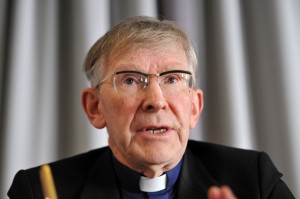
By Sarah Mac Donald - 20 March, 2016

A special Mass for peace and reconciliation is to be celebrated in Cork by Bishop John Buckley in early April as part of the diocese of Cork and Ross’ commemorations of the 1916 Rising.
Speaking ahead of the Mass, which will take place at in Holy Trinity Church, Fr Mathew Street, at 12:30pm on Sunday 3 April, Bishop Buckley said the Mass will be a time for reflection not celebration.
“We visit our history, not to find what divides but what unites us,” he said in a statement issued on Saturday.
Dr Buckley said the Mass will also be an opportunity to pray for the 485 men, women and children who died violently in 1916, “on whatever side or none”.
“We, as people of faith, pray also for the British soldiers and the RIC members who died on the streets of Dublin, many of whom were Irish. We will also remember the 580 Irish soldiers who died on the Western Front in the First World War during that week.”
He added that some of those who survived received a very cold reception when they returned home.
“We will pray also for those who died during the violence in Northern Ireland including the many people who are still suffering from its effects to this day.”
In his announcement, Bishop Buckley said Holy Trinity Church had been selected because of the important pastoral role exercised by members of the religious orders, especially the Capuchin Community, some of whose members wrote very informative, personal narratives on the Rising.
“We must commemorate 1916 in a way that respects all past differences and does not glorify violence retrospectively. This Remembrance will be a sign that the conflict is over. Sadly, the threat of violence has not completely disappeared.”
He emphasised that “There is no moral legitimacy whatsoever for violence today. There is always a danger that anniversaries have the potential to influence people negatively. There is a thin line between celebration and commemoration.”
“If we only remember one side, we are telling ourselves that the conflict is not truly over. The Good Friday Agreement democratically and peacefully removed any remaining cause of conflict.”
He welcomed the fact that a Commemorative Wall is to be erected in Glasnevin Cemetery in Dublin which will bear the names of all who died in 1916 regardless of which side they were on – or if they were on no side – and whether they were bearing arms or not.
“We should be extremely careful in case the celebrations would, in any way, contribute to an increased tension in Northern Ireland. It has been said that aspects of the 1966 commemoration were subsequently used to justify violence. Our aim should be to promote friendship and harmony,” Dr Buckley said.
“Even though the official Catholic Church and the newspapers at the time did not approve of the Rising, nevertheless they maintained that the volunteers were men of high idealism and self-sacrifice who really believed that they were pursuing a noble cause, while reminding us, at the same time, that great progress had been made towards the goal of an independent Ireland.”
“We should not forget the religious spirit that animated the Rising. The leaders were people of profound faith and received the sacraments before their executions. The poetry of Padraig Pearse and Joseph Mary Plunkett is deeply religious.”
He recalled Plunkett’s ‘I see his blood upon the rose’ and Pearse’s ‘Iosagáin’.
“As Pearse himself said in 1915 at the grave O’Donovan Rossa, ‘Splendid and holy causes are best served by splendid and holy people’.”
“Indeed, the religious and cultural legacy of the 1916 leaders, which reflected the Church’s social teaching at the time, may be as significant as their political legacy.”